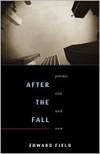 After The Fall: Poems Old and New
After The Fall: Poems Old and New
By Edward Field
University of Pittsburgh Press, 160 pages.
ISBN-10: 0822959801
Reviewed by Dan Vera
The appearance of new poems by Edward Field is always a cause for celebration. The master poet begins his most recent collection, After the Fall: Poems Old & New with a series of poems that serve as gutsy ars poetica on the engagement of the poet with the world. Under the title “What Poetry Is For” Field surveys the landscape of the wartime Bush years. Some of the poetry is time-sensitive and will soon (hopefully) read to the future as a time capsule of our era. In “Letter on the Brink of War” Field bears witness to what the unjaundiced eye sees at the beginning of a disaster he has lived through before:
They even talk of shock and awe–
another term for blitzkrieg’s sturm and drang–
and instead of Jews, the roundup of Muslims,
But you have to ask, Who’s next?
“Homeland Security” extends the theme by offering an analysis of the police state tactics faced by those who raise suspicion. Field has a way of writing that delivers a punch with the deftest of comic timing. It leaves you smiling and wincing at the same time.
What I have always loved about Field’s writing is its utter lack of pretense and its firm conviction in telling the truth. Beauty is not the word here. Breathtaking is. You read a marital poem like “Oedipus Schmoedipus” or the searing indictment of Jews complicit in the current administration’s wrong-doing "But what are Jews doing in this government? / Wasn’t civil liberties always a Jewish passion?" and you understand why Plato wanted poets banned from his Republic for their insistence on telling the truth. There is also humor. Lots of it —whether writing on aging in “Prospero, in Retirement,” or his apologia to his lover who must live with “the poet” in “Mrs. Wallace Stevens,” Field always delivers. Take “In Praise of My Prostate” in with Field celebrates his body’s resiliencies:
and you still expand, your amazing flowers
bursting forth throughout my body,
pistils and stamens dancing.
When you’re dealing with a great poet, the beauty of a volume of selected works like this—especially for the uninitiated—is its ability to offer up new work that captures your affections, and also present the earlier work that serves as confirmation that this genius has roots and, even better, offer a past catalogue of volumes to seek out. Here in one gem of a book are the poems I have loved for many years. Field’s “The Life of Joan Crawford” from his 1967 volume Variety Photoplays, “From Poland,” and “Mae West” are here too.
As he did in his memoirs published three years ago, Field continues his clear-eye seeing and saying of the world. I believe he writes with the clear understanding that there is a beauty to be found in honesty. With After the Fall Field somehow gives courageous permission to be more honest in our lives. As if saying life is more fun and more compelling by facing the truth of oneself. In all its beauty. I truly believe it.
This is just an excerpt from this issue of White Crane. We are a reader-supported journaland need you to subscribe to keep this conversation going. So to read more from this wonderful issue SUBSCRIBE to White Crane. Thanks!
Dan Vera is managing editor of White Crane. He lives in Washington, DC where he writes poetry, organizes readings and publishers books of poetry. Visit him at www.danvera.com